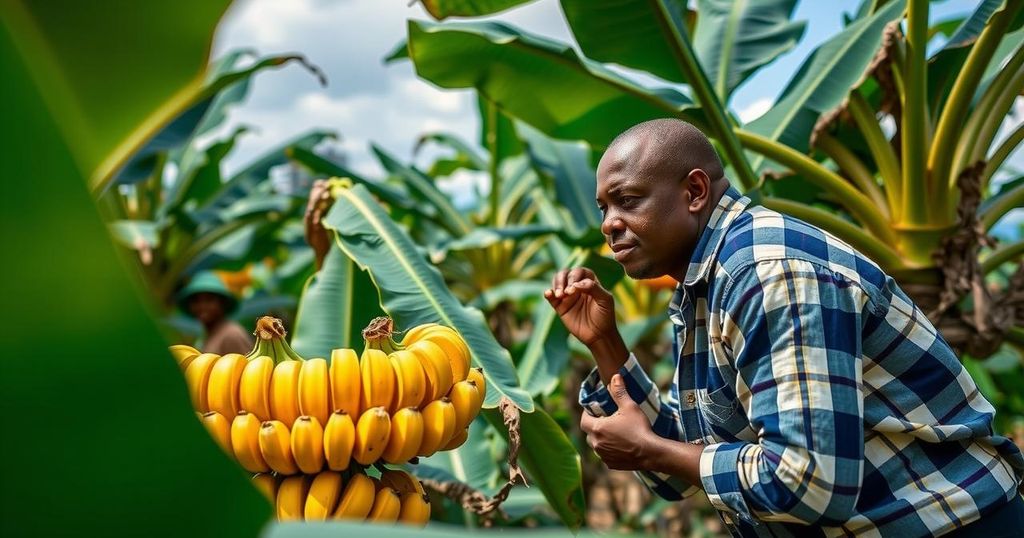Innovative Insurance Solutions for Uganda’s Banana Farmers Amid Climate Challenges
A novel insurance initiative in Uganda is aiding banana farmers in coping with climate change-related challenges. Following a devastating hailstorm, farmer Ahumwire Justine reflects on the vulnerabilities faced by her uninsured plantation. The NDC Action Project seeks to mitigate these risks by providing farmers with training on smartphone usage and crop damage documentation, streamlining insurance claims through digital platforms. With an aim to expand its reach, the project hopes to secure the livelihoods of 50,000 farmers across the nation, thus promoting resilience in the face of an uncertain climate future.
In Uganda’s southwest, Ahumwire Justine has faced the harsh realities of climate change as a banana farmer. A severe rain and hailstorm devastated her plantation last October, destroying 300 banana trees and killing two cows. In the aftermath of this calamity, Justine and her family encountered severe food shortages and financial hardship, contemplating abandoning their two-hectare, uninsured plot of land. Climate change has exacerbated such circumstances, with the Intergovernmental Panel on Climate Change noting an increase in the frequency of extreme weather events. In response, the NDC Action Project, a collaborative initiative of the United Nations Environment Programme (UNEP) and the UNEP Copenhagen Climate Centre (UNEP-CCC), aims to enhance the resilience of farmers like Justine against climate-related disasters. Mirey Atallah, Chief of the Adaptation and Resilience Branch in UNEP’s Climate Change Division, emphasizes the importance of integrating technical and financial solutions to aid smallholder farmers in their adaptation efforts. “We know farmers, particularly smallholders, are struggling to adapt to the effects of the climate crisis. That’s why projects that combine technical and financial instruments such as these are so important.” Bananas occupy a crucial position in Uganda’s economy, with 47 percent of farmers involved in their cultivation as of 2019. However, shifting climate patterns over the last fifteen years have placed banana farmers at significant risk, as emphasized by Florence Muranga, Director of the Banana Industrial Research and Development Centre. She notes, “[Farmers] can lose their food, their livelihood, their house in one day.” To address this vulnerability, the Banana Industrial Research and Development Centre has initiated training programs for farmers on utilizing smartphones to document their crops. This technology allows farmers to report damage due to adverse weather, enabling agroeconomists to assess losses efficiently. Remarkably, nearly 50 percent of the initial 930 trained farmers are women, showcasing inclusivity in adaptation strategies. In addition, the initiative collaborates with Agriculture and Climate Risk Enterprise Africa and Agro Consortium Limited, which streamlines insurance processes through digital platforms, promoting swift payouts while minimizing in-person claims inspections. Farmers are also trained in water management and agroforestry, boosting productivity and lowering the risk of climate-related losses, which makes them more attractive to financial institutions for loans. The project is expanding to eventually encompass 50,000 banana farmers across Uganda, with Justine acknowledging the invaluable peace of mind provided by the insurance coverage. “I know that if [my crops get damaged] I have help. It is not like in other years, where I would have to start from zero.” Ultimately, UNEP’s initiatives align with the goals of the Paris Agreement, driving efforts toward climate stability through targeted actions across various sectors, including agriculture. This innovative approach exemplifies how technology and insurance can serve as critical tools for safeguarding the livelihoods of smallholder farmers in the face of escalating climate challenges.
The agricultural sector in Uganda, particularly banana cultivation, faces substantial threats from the impacts of climate change, including increasing occurrences of extreme weather events such as heavy rainfall and droughts. As a staple in Uganda’s economy and sustenance for many, bananas represent a vital crop for smallholder farmers. Recent initiatives aim to provide these farmers with access to insurance to mitigate the financial ramifications of climate-related damages. The NDC Action Project collaborates with various stakeholders to use innovative technologies and training to enable farmers to document crop conditions and claim losses effectively, thereby fostering resilience against unpredictable weather patterns.
The introduction of an innovative insurance model for Uganda’s banana farmers represents a significant step forward in providing a safety net against climate change-induced risks. By leveraging digital technology and inclusive training programs, farmers like Justine are not only being equipped to manage the impacts of weather fluctuations but are also regaining financial stability and peace of mind. This initiative demonstrates the potential of combining technology with financial instruments in addressing the urgent challenges posed by climate change in agriculture.
Original Source: www.unenvironment.org




Post Comment